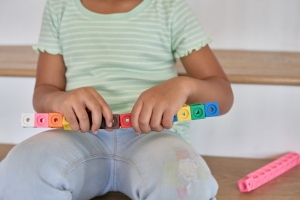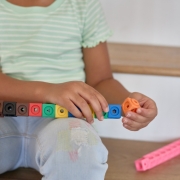How Do Fidget Toys Help?
The importance of fidget toys for children
Fidgeting is extremely common, and to understand why fidget toys are so popular, you first need to understand why children fidget. Fidgeting can be a self-regulation mechanism that is unconsciously used by the child’s body to either boost or lower attention levels; meaning fidgeting might indicate a problem with attention, but it could also be the solution.
Common types of fidgeting include hair twirling, foot-tapping or nail-biting. While many consider these activities counterproductive to learning, many experts believe that if these fidgeting behaviours can be re-directed, they can actually enhance learning.
How do fidget toys help? Fidget toys are important in allowing children to be able to fidget in a structured way, helping them to concentrate and learn.
Fidget toys are designed to improve focus,relieve nervous energy, reduce anxiety and psychological stress. The physiological stimulation that fidgeting provides can bring your child’s attention back to the task at hand and allow them to focus better, meaning they actually benefit from fidgeting and improve learning ability.
Anxiety, stress and other disorders, including attentiondeficit hyperactivity disorder ADHD, can have an effect on the body as a whole, but the most notable effect is on the hands. While fidget toys do not cure these issues, they can help keep hands busy, calming your child’s mind and aiding increased focus, meaning they may be less likely to suffer.
Fidget toys are sensory tools that help increase attention by allowing your child to focus more in school or at home, boosting productivity and learning.
How do fidget toys help the brain? Studies have shown that both the right and left hemispheres of the brain are required for learning and carrying out many educational tasks. Case studies have confirmed that increased focus in a learning setting was achieved in a student who was using a stress ball fidget toy to help stimulate these areas with both movement and sensory input.
Different types of fidget toys
There are many types of fidget toys for all types of fidgeting needs; they come in a variety of shapes, sizes and textures all used to increase tactile input and promote movement. They range from fidget spinners to fidget cubes, putty to poppits, sensory balls to squishies; the list is endless.

Connect, build, snap and twist the Edx Education UK fidget toy pack of 100 Fidget Cubes or Edx Education USA fidget toy pack of 100 Fidget Cubes. Each pack includes 10 different colours and 5 shapes. These sensory fidget cubes connect with a satisfying ‘click’ as you feel them ‘snap’ together. They can link together on all sides and feature different geometric shapes: circle, square, triangle, pentagon and hexagon. You can build them up, over, down or out so you can create endless 2D and 3D shapes, matching the shapes and creating patterns.
Use our snap and click fidget toys to relieve OCD, stress, anxiety; also great for children with ADHDand autism. They are portable and easy to take with you anywhere. Adults and teens love to keep their hands (and minds) busy with our fidget cubes too. These 2cm square sensory fidget toys are made of made from high-quality, smooth-to-touch durable plastic with rounded edges, which feels great in your hands.
Regardless of the type of fidget toy used, the goal is the same – to help focus attention and improve learning. Research indicates that most children learn better when their hands are active and funnelling expandable energy in this manner allows them to better focus on what they are trying to learn. In addition to the improved learning benefits, and anxiety and stress-reducing benefits, they enhance dexterity, improve coordination and fine motor skills and assist in the development of muscles of small hands.
Fidget toys are generally appropriate from 3+ and are suitable for most developmental abilities. Note that it is recommended that parents speak to their child’s teacher or principal before they consider bringing fidget toys to school. Do seek medical advice if you feel your child’s anxieties are worsening over time.
For home learning toys for different age groups, abilities and developmental stages, view our full range here:
https://www.shopedx.co.uk or www.amazon.com/edxeducation
Edx Education – Heather Welch
To find your local Edx Education retailer head over to Where to buy – Edx Education.



